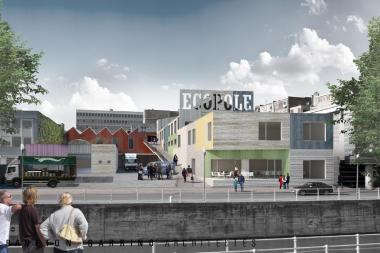
2013-06-19 – The future Ecopole site will extend from Rue de Birmingham as far as the banks of the Canal at Quai Fernand Demets and the Delacroix metro station. The project will construct platforms for the recovery and reuse of certain types of waste, with support from the Brussels-Capital Region and the European Regional Development Fund (ERDF).
This 6,000 m2site has belonged to the Region since 2011. The planning application was submitted in April 2013. The contract award procedure is scheduled for summer 2013, and work should start in early 2014.
First recycle buildings, then objects
The goal of the project, which is coordinated by the Agence Bruxelles-Propreté (the regional agency responsible for cleanliness), is to host businesses that reuse old objects thrown out by the people of Brussels such as computers and household appliances, enabling them to be recycled and put back into commercial circulation. The same approach has been taken to the industrial premises that currently stand at 102 Rue de Birmingham: six of the eight halls will be kept, renovated and put to new use, thus gaining a second lease of life.
The building’s original spirit has been preserved, but it is now oriented towards the future. Three floors will be used by companies and different, sometimes complementary, projects. The upper part of the site, on the Rue de Birmingham side, will become a circulation and open-air storage area. In the lower part, the challenge will be to free up access to the site and open it up to the Canal. However, it will not be possible to use the waterway for goods transportation: at this location, just opposite the Anderlecht Abattoirs, the Canal is not wide enough and has no quays for unloading goods.
Varied networks
Several Ecopole partners have already been identified, with clearly defined roles.
- The company CF2M has launched the CF2D project, which is already set up on the site, for the recovery and resale of electronic waste. A showroom will be opened on the site.
- The company Ecotop Giga Services will set up a service for the reuse of ink cartridges. Here too, the idea is to put the cartridges back into commercial circulation, as they can last for five to nine lifecycles.
- Relego will process and recycle construction waste. The company will give contractors on-site support with the recovery of basic building materials. The goal is to encourage selective sorting and reintroduce materials into the construction sector wherever possible.
- There will also be space for the Oliris project, in connection with the waste collection activities of Groupe One and Retrival. Its sphere of action is the hospitality and catering sector in Brussels: cooking oil will be collected and pretreated for later conversion into bioethanol.
- One part of the resource centre’s activities will form the project’s centre point. Its goal is to sort bulky waste items with a view to selling them. The project will start with a Les Petits Riens outlet in the area of white household goods such as washing machines and other domestic appliance, but may expand its field of activity later on.
- Finally, Ecopole will also start a project that focuses primarily on research and development, with a ‘design point’ where products created from recycled objects are presented. An example might be bags made from old tarpaulins, but in principle any recycled items could be used to make new products.
As these projects all revolve around the same kind of activity, partnerships should spring up on the site. In any case, the idea is that individual operators will not be confined to their own workplace.
Jobs and an expertise centre
The raw materials, estimated at around 4,500 tonnes per year, will arrive in different wayson the site. Some projects will have their own recycling systems and the Agency Bruxelles-Propreté will also send part of the waste it collects for recycling to Ecopole. This latter input will represent around a third of the total, or 1,500 tonnes.
Once the site is operational, between 45 and 77 jobs should be created there. Ecopole will work with partners from the social economy, and Actiris (the Regional office for employment) will also be involved in the job creation process.
In the upper part of the site (Rue de Birmingham), each activity will have its own space and autonomous operations. However, the architectural plans include a footbridge, open to the public, which will link it with the lower part. The bridge will serve an educational purpose, enabling pedestrians to watch the different partners’ activities and giving them access to the showrooms. In a new building to be constructed, there will also be a cafeteria where workers can have a break and visitors can be received.
Ultimately, Ecopole will develop into a centre of expertise in the field of waste recycling in the Brussels Region. Its goal is not just to reduce the quantity of waste that is destroyed, but to find innovative solutions for each type of recyclable object.
Jean-Pierre BORLOO

















